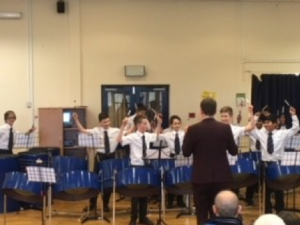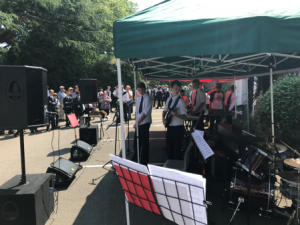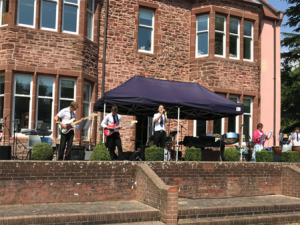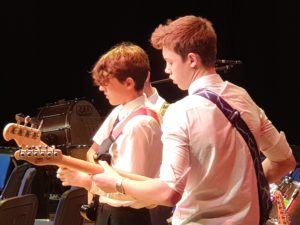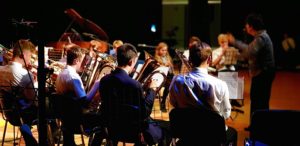Music
Head of Department – Mr C. Eastman
At TBGS, we aim to inspire and develop the musicians of the future.
Music is a universal form of human expression and a unique way of knowing that engage us in effective, imaginative and productive activities. Learning through music helps us to explore, shape and communicate our sense of identity and individuality.
In music, skills are knowledge. Thus our primary concern is to provide a sequenced curriculum in which students can develop fundamental technical, expressive, analytical and collaborative musical skills through engagement in a broad and varied music education which enables students to explore the similarities, differences and links in music from within their own culture and that of others across time. A vibrant musical education fosters curiosity and openness to both familiar and unfamiliar musical worlds.
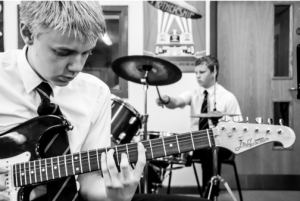
Many students love the practical and expressive way that music is taught here and choose to continue their learning through our excellent instrumental teaching, broad range of extra-curricular opportunities or personal study.
By the end of KS3 students of Music at TBGS:
1. Gain opportunities for lifelong engagement with music
2. Develop technical and expressive solo and ensemble performance skills on a range of instruments
3. Explore and value the diversity of music across time, place and cultures
4. Develop an expressive and technical understanding of how musical devices are used to compose new music.
5. Develop perceptual and analytical skills.
6. Develop a practical understanding of the varied uses of ICT in music-making.
Those who continue to study Music at KS4 & KS5 additionally:
1. Become informed, reflective and critical practitioners of music
2. Develop their knowledge and potential as musicians, both personally and collaboratively.
This is achieved through units of work that cover each half term (or around weeks at KS4/5). For each unit, students prepare a performance or composition in response to a range of musical stimuli.
KS3 Music
KS3 is used both to inspire students’ creativity and prepare them for GCSE. Students will have access to a diverse selection of instruments (wind, keyboard, rock band, percussion etc), musical cultures and technologies (including Sibelius notation software and Mixcraft DAW).
Every year the music department rents a set of instruments from a different part of the world for one term. Students play and study these instruments, leading up to performances in our World Music Concert. In the past students have played and composed for steel pans, Javanese gamelan and samba drums.
Year 7

In Year 7, students learn a wind band instrument – clarinet, saxophone, trumpet, trombone, baritone or euphonium, which they choose in collaboration with the teachers at the start of the year.
Through year 7 students use this instrument to develop their performing and composing skills, as well as experiencing the discipline it takes to learn an instrument. At the end of the year, the very best students perform in the year 7 concert.
Through year 7 students will also have the opportunity to use the music programme Sibelius to write a fanfare, as well as develop vocal skills.
Year 8
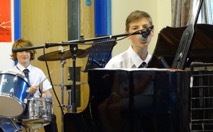
At the start of Year 8 students receive a foundation course in keyboard playing, which they then use as the basis of their learning for the rest of the year.
Learning in Year 8 is more topic-based, with students studying composition over chords, jazzand hip-hop. We also start to explore music technology in more depth. This prepares students for GCSE music, and the modern music industry, as well as enabling students to fully express their musical ideas outside the limitations of their performance skills. the rest of the year students work in the music computer suite to do compositions using the music programme Sibelius and Mixcraft..
Year 9
In Year 9, students get to form their own band and choose instruments such as guitar, bass guitar, and drums to play. Throughout the year they advance musically as well as growing in independence and developing teamwork skills. Through this, they study Reggae, Riffs and even get to Pupils finish year 9 with a completely independent project, which encourages organisational and social skills, choosing and create their own version of any song as part of a band.
Students in Year 9 compose a concerto for soloist and string orchestra using Sibelius, a fusion piece using the year’s World Music instrument and a film score.
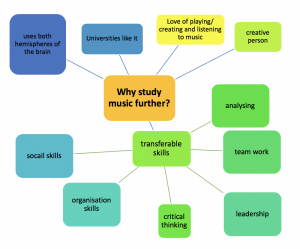
GCSE- (Eduqas)
Music is a challenging and academic subject, and students gain real discipline from playing an instrument or from composing. Through performing, composing and listening to music, students learn about:
- Musical Forms and Devices
Understanding the way that music is put together, with a focus on the Western Classical Tradition
- Music for Ensembles
Learning about texture, instruments and sonority in Jazz, Blues, Musical Theatre and Chamber music.
- Film Music
Studying the way that musical devices are used by film composers in the 20thand 21stcenturies.
- Popular Music
Including rock, pop, fusion, and dance music.
Assessmentis through Performing (one solo and one ensemble piece), Composing(two pieces) and Appraising(answering questions in response to musical extracts.
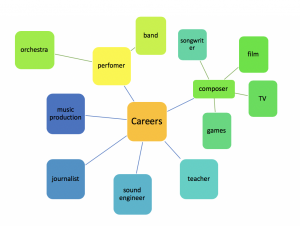
A Level, AS Level (Eduqas) and IB Music
Students will further develop their musical skills, knowledge and understanding through the practical and academic study of a broad range of musical genres, engendering a passion for the subject. Students are encouraged to make links between the disciplines of composing, performing and appraising, becoming independent, reflective and enquiring musicians.
An integrated approach is taken to teaching of the music A Level. Students take the opportunity to perform works from each area of study and to compose using the stylistic conventions of the relevant genre. Listening and appraising is used to support composition and performance work as well as develop the critical skills required for the examination.
A and AS Level Music: Students study the following genres:
Western Classical Tradition;
Rock and Pop, Musical Theatre or Jazz.
Into the Twentieth Century or Into the Twenty First Century (A Level only)
IB Music:
Students study two large scale set works: Brandenburg Concerto No 2 (JS Bach) and Dances of Galanta (Z Kodaly) as well as a learning about music from a huge range of different cultures. They must also complete a ‘Musical Links’ essay.
Assessmentfor all qualifications is through Performing,Composingand Appraising(answering questions in response to musical extracts, though the exact requirements differ for each.
Extra-Curricular Activities
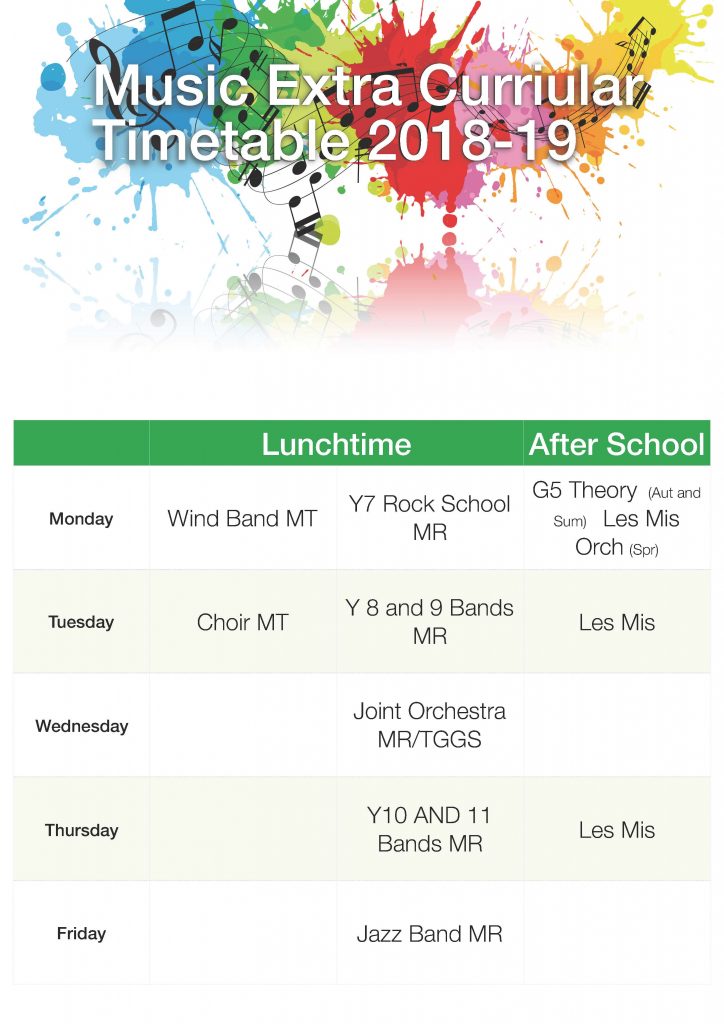
The music department is a lively and active part of the school, which gives all members of TBGS lots of opportunities to get involved in extra-curricular music making. Much of the music performed is influenced by the students’ interests.
There is a wide variety of opportunities for pupils of TBGS to perform or show work to parents and the public, includings an Autumn Gala Concert, Carol Service, World Music Concert,Year 7 and 8 Concerts.
In 2018 the music department and student council hosted the inaugural Tor-chella Music Festival. A variety of acts performed on across three stages for the whole school and some proud parents and guardians, supported by students from various tutor groups and teachers who provided food and other entertainment.
